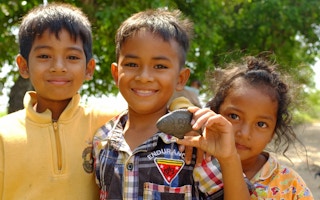Making sustainable lifestyle and consumption decisions is not only the right thing to do, it is also becoming more affordable and convenient than conventional options, said Danish think tank Sustainia, which launched its annual listing of the top 100 sustainability solutions on 11 June.
To continue reading, subscribe to Eco‑Business.
There's something for everyone. We offer a range of subscription plans.
- Access our stories and receive our Insights Weekly newsletter with the free EB Member plan.
- Unlock unlimited access to our content and archive with EB Circle.
- Publish your content with EB Premium.
Innovations which make it easy for consumers and companies to reduce the amount of resources they use and waste and those which address the needs of communities at the ‘base of the pyramid’ - those who live on less than eight dollars a day - were the big winners in the study, titled Sustainia100.
The featured innovations - a fifth of which are from Asia - were chosen from more than 1,500 entries by a panel of judges made up of experts from Sustainia and organisations like the Ellen MacArthur Foundation, United Nations World Food Programme, and World Resources Institute, among others.
Solutions had to be readily available, scalable and financially viable to make the list. They also had to demonstrate a positive environmental impact and an ability to improve people’s quality of life.
More than half of this year’s list comprised products and services that are not only sustainable, but also cost-competitive and convenient, noted Sustainia in a statement.
The companies behind these innovations achieve this through business models that involve reusing, recycling, and taking back items.
These are also key concepts in the circular economy, a new way of doing business that moves away from linear ‘take, make, waste’ modes of production to ones that focus on reducing waste and keeping resources circulating in manufacturing systems through recycling and reuse.
One such product is a hearing aid with solar-powered battery chargers made by Brazilian social enterprise Solar Ear. These devices cost the same as conventional models which have zinc batteries. But while the devices with zinc batteries last only a week, Solar Ear lasts up to three years.
Danish clothing company Vigga, which allows new parents to rent organic clothes for their child and exchange it for larger sizes as the baby grows, is another featured business that can save parents up to $2,100 in the first year of their baby’s life.
“
This year’s Sustainia100 are fantastic, because they show how practical and affordable sustainable alternatives are for everyone.
Arnold Schwarzenegger, former Governor of California and Honorary Chair of Sustainia
A Singapore company, Sky Greens, also made it onto the list for its sustainable vertical farming system, which uses less than five per cent of the water and 25 per cent of the fertiliser used in traditional farms.
Arnold Schwarzenegger, former Governor of California and Honorary Chair of Sustainia, commented that “this year’s Sustainia100 are fantastic, because they show how practical and affordable sustainable alternatives are for everyone.”
“Anyone can be a champion for a healthy lifestyle and more liveable communities,” he added.
Laura Storm, chief executive officer, Sustainia, noted that commodity prices had increased in the past 15 years, and this had given “businesses and consumers a good reason to break free of the linear model of resource use”.
“In the new Sustainia100 study, it is remarkable to see how creative developments in particularly the circular economy are resulting in products and services highly competitive with non-sustainable alternatives,” she added.
In addition to reducing resource use, 23 of the Sustainia100 innovations were also targeted at improving the lives of people in underserved markets and poor countries, where there is a strong need for reliable energy, sanitation, and waste management.
For example, to reduce endemic iron deficiency in many poor communities worldwide, a featured social enterprise called Lucky Iron Fish makes fish-shaped iron ingots from recycled metal. Boiling these fish, for 10 minutes can release up to 75 per cent of a person’s required daily iron intake. These fish - which cost less than US$10 - last families for five years, and are an “affordable, clinically proven and culturally appropriate” health innovation, says the company.
This list of solutions - now in its fourth year - comes just a few months before global leaders meet in Paris in December to hammer out a legally binding agreement on curbing climate change.
The fact that there are at least 100 readily available solutions for cities, corporations, and consumers highlights the potential for a bottom-up transformation, said Sustainia.
In a foreword for the study, Christiana Figueres, executive secretary of the United Nations Framework Convention on Climate Change, said that a big question on leaders’ minds in December would be whether the world had solutions that could achieve a sustainable future for all.
“The answer is yes,” she said. “These 100 solutions, alongside many other parallel and catalytic actions (…) fill me, and should fill leaders with extraordinary optimism.”
Tackling climate change, protecting vulnerable communities and eradicating poverty are “infinitely possible,” added Figueres. “We have the solutions right now. We just need to embrace and power them up for the good of everyone,” she added.










